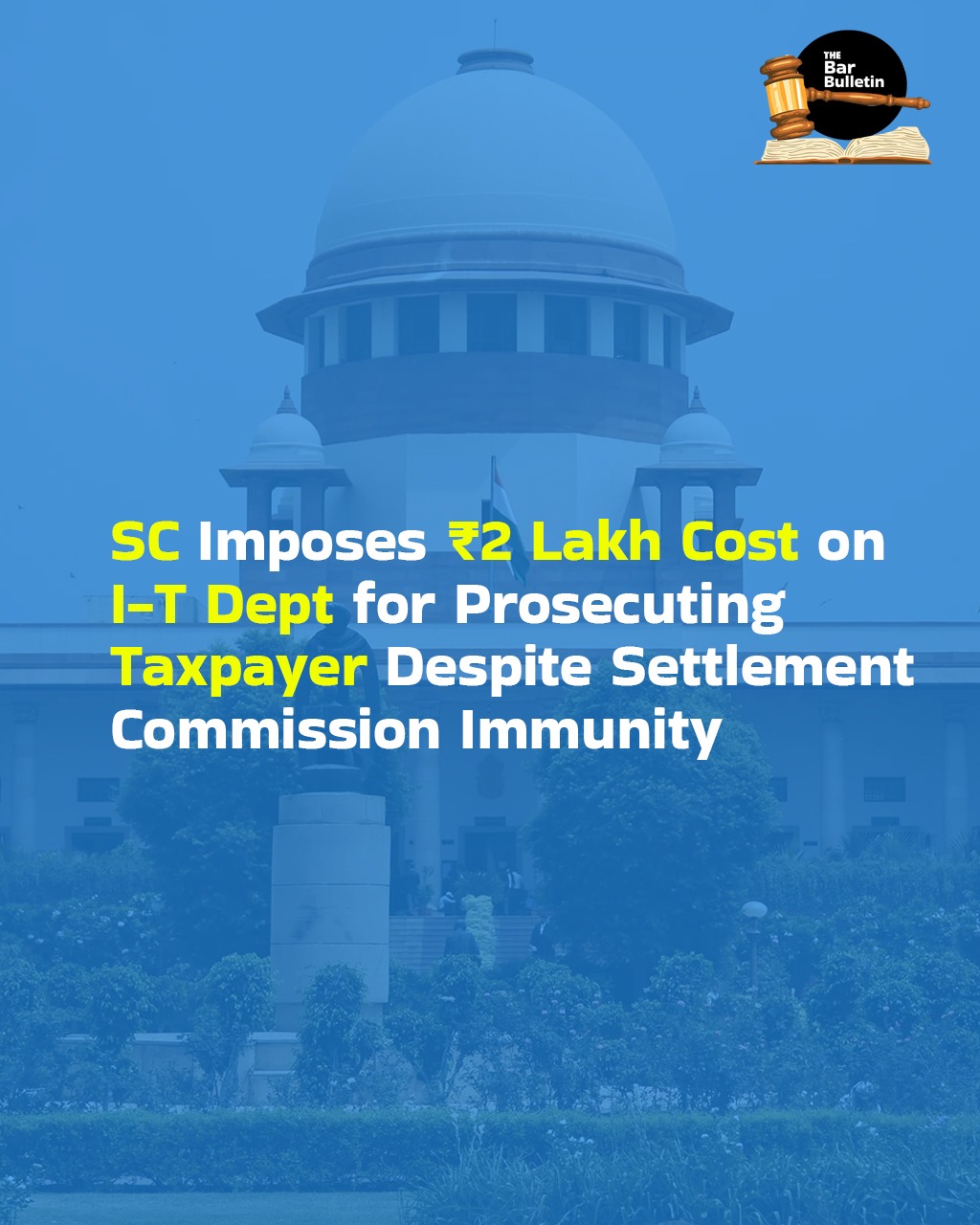The Supreme Court yesterday ruled that every order of settlement shall be conclusive as to the matters stated therein, and no matter covered by such order shall, save as otherwise provided, be reopened in any proceeding under the Income Tax Act or under any other law for the time being in force. The Apex Court highlighted that since the immunity from penalty was already granted by the Settlement Commission, then lodging prosecution with the help of the proviso to sub-section (1) to Section 245H in defiance of the CBDT Circular dated April 24, 2008, is in vogue.
Since the revenue authorities were persistent in pursuing the prosecution without looking into the procedural lapses on their part, acting in blatant disregard of the binding statutory instructions, and in defiance of the orders of the Settlement Commission, the Apex Court quashed the prosecution lodged by the Revenue Department against the appellant and imposed a cost of Rs. 2 lacs on the Department for their serious lapse and wilful non-compliance of their own directives.
The ruling came after finding that the appellant taxpayer has disclosed all the facts material to the computation of his additional income and fully satisfied the provisions of Section 245H of the Income Tax Act, and the Settlement Commission has recorded a finding that overall additional income is not on account of any suppression of any material facts and it does not disclose any variance from the manner in which the said income had been earned.
Pointing out that the dismissal of the quashing petition by the High Court has resulted in the appellant facing trial for an offence in which a settlement was already entered by the Revenue Department with the appellant, granting him immunity from the levy of penalty, the Division Bench of Justice J.K. Maheshwari and Justice Vijay Bishnoi observed that “if an assessee has made suppression of income without disclosing the manner in which the excess amount was earned and concealed the account, making a wilful attempt to evade the tax which may be imposable and chargeable or payable, he/she is required to be prosecuted. However, the recourse to lodge prosecution was made permissible subject to the department’s circular dated 24.04.2008, which provided for confirmation by ITAT in case the penalty imposed under Section 276C(1) exceeds Rs. 50,000/-“.
Since the complaint was filed by DDIT after the sanction of PDIT before the Additional Chief Metropolitan Magistrate on August 11, 2018, and an application under Section 245(C) was filed by the appellant before the Settlement Commission later, and on the date of lodging the prosecution, the finding of concealment of income or imposition of the penalty of more than Rs. 50,000/- has not been recorded by the ITAT, the Bench held that the act of the revenue authority in continuing prosecution is in blatant disregard to their own binding circular dated April 24, 2008 and in defiance to the guidelines of the Department, as no explanation has been put forth by Revenue to demonstrate as to why PDIT or DDIT did not comply the procedure while lodging prosecution in this case.
The Bench referred to Section 276C(1) to observe that the said provision is primarily intended to deter and penalize wilful and deliberate attempts by a taxpayer for evasion of taxes, penalties, and interest before their imposition or charging. The provision applies where there is a conscious and intentional effort to evade tax liability, distinguishing such conduct from bona fide errors or differences in interpretation.
Speaking for the Bench, Justice Maheshwari emphasised that the Income Tax Act envisages a robust settlement mechanism under Chapter XIXA, which was inserted by means of the Taxation Laws (Amendment) Act, 1975 (41 of 1975) w.e.f. 01.04.1976, pursuant to the recommendations of the ‘Wanchoo Committee’ report, titled ‘Black Money and Tax Evasion’. In furtherance of those recommendations, an amendment was brought adding Section 245H, empowering the Settlement Commission to grant immunity from prosecution and penalty.
The Bench then proceeded to refer to the Departmental circular dated April 24, 2008, Prosecution Manual, 2009, and CBDT’s circular dated September 09, 2019, which provided as to when the prosecution ought to be lodged by Revenue, so as to regulate the lodging of prosecution in genuine cases and to weed out the problems of the tax payers, and also to understand when can the prosecution for Section 276 ought to be lodged and continued.
Briefly, in this case, on April 04, 2016, a search was conducted at the residence of the appellant, and unaccounted cash of Rs. 4,93,84,300/- was seized. The show-cause notice (SCN) issued to the appellant as to why prosecution should not be initiated against him was challenged but dismissed being premature. Later, an appeal challenging such dismissal was also dismissed as infructuous, taking into consideration the subsequent developments and the order of the Settlement Commission (SETCOM). In the meanwhile, the Principal Director Income Tax, by exercising power under Section 279(1), ordered DDIT to initiate prosecution against the appellant, and the respondent-DDIT filed a complaint against the appellant for an offence under Section 276C(1), alleging wilful attempt to evade tax and for not filing the correct return of income.
When the petition under Section 482 of CrPC praying for quashing of the complaint was pending, the appellant approached the SETCOM under Section 245C, disclosing the entire additional income and seeking immunity from levy of penalty as well as prosecution in the matter of alleged evasion of proposed tax, which was partly allowed, and the appellant was granted immunity from levy of penalty. However, the SETCOM refrained from granting immunity from prosecution due to the pendency of the quashing petition before the High Court of Madras, but the quashing petition came to be dismissed. Hence, the appellant was left with no option but to knock on the door of the Apex Court.
Appearances:
Advocate Ravi Raghunath, for the Appellant
Advocate Raj Bahadur Yadav, for the Respondent



